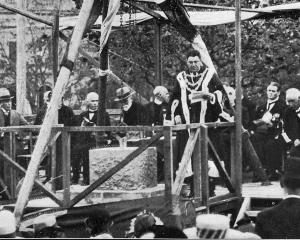
Harbour oil spill
An undesirable memento of an oil-fuel steamer was unpleasantly evident on the foreshore at Port Chalmers on Saturday morning. Before sailing the previous evening an American oil-fuel steamer had pumped a quantity of crude oil into the harbour. It was either the residue from an oil tank or drainage from the bilges, and its ejection was unobserved, or the harbour authorities would have taken steps to stop the proceedings. The oil was floating as a thick scum on the surface, and it was of a black, sticky nature resembling coal tar. As the tide receded the stonework under the cross wharf was painted a shiny black, and the wharf piles looked as though a coat of coal tar had been newly applied to them. Steamers berthed at the wharves displayed a very even waterline marked in black. Motor launches and rowing boats also showed an overnight waterline in sticky black.
Floating oil fuel has not won approval on the foreshore at Port Chalmers.
Rabbits run riot
Lauder: The most interesting thing in Central Otago just now is rabbits. It is running in everybody's mind and on almost everybody's land. Yet the law says that it is a pest, and must be destroyed, and some 18 farmers were penalised at Ophir on Friday last for not making adequate efforts to exterminate him. The rabbit is fast becoming a national problem because, though legally a pest, he is proving himself a highly profitable one. Many rabbiters have been enjoying an income of £5 and £6 a day by trapping the ubiquitous rabbit; canning factories at Cromwell, Alexandra, and Waipiata have been the scenes of bustling activity; some £3000 and £4000 a year. Under the present conditions it is evident that the rabbit has come to stay. All the murderous ingenuity of man as shown in traps and guns, ferrets and weasels, phosphorus and strychnine have failed to cope with his amazing fecundity.
— ODT, 19.4.1920












